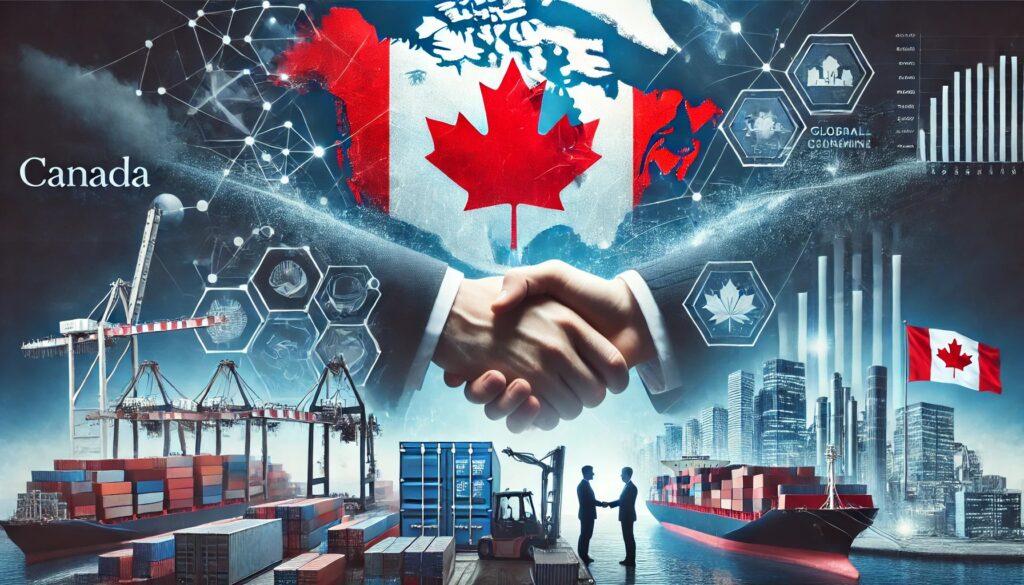The Impact of Tariffs on Canada: A Call for Economic Diversification
March 9, 2025
Sector:
Canada’s Trade and Economic Strategy
As a Chartered Professional Accountant (CPA) in Canada with extensive experience analyzing international trade and economic policy, I’ve witnessed firsthand how Canada’s economy has been profoundly shaped by our historical trade relationship with the United States. However, recent trade tensions, evolving tariff regimes, and global economic uncertainty underscore the urgency for Canada to diversify its trade portfolio and reduce over-reliance on any single trading partner.

The Impact of Trade Uncertainty on Canadian Businesses
The current landscape of tariffs and trade negotiations between Canada and the United States is dynamic and often unpredictable. This environment of uncertainty can lead to:
- Supply chain disruptions
- Rising operational costs
- Unpredictable delays in delivery
- Increased business risk exposure
Given these challenges, Canadian businesses cannot afford to adopt a “wait and see” approach. Instead, it is crucial to proactively prepare for both short-term volatility and long-term policy shifts.
A Modern Trade Strategy: Strengthening Canada’s Economic Resilience
To secure Canada’s long-term economic stability, it’s essential to adopt a comprehensive trade and economic strategy that balances domestic self-reliance with expanded international trade opportunities. Here are the core pillars of this evolving strategy:
Enhance Self-Reliance
- Boosting domestic production: Canadian businesses should prioritize local manufacturing and supply chain independence.
- Encouraging innovation: Investment in R&D and technology adoption is critical for maintaining competitiveness.
Eliminate Provincial Barriers
- Reduce interprovincial trade restrictions: Streamlining regulatory differences and harmonizing standards will foster a stronger, unified national marketplace.
- Related reading: Interprovincial Taxation & Compliance
Expand Global Trade
- Strengthen ties with emerging markets: Proactively negotiating and leveraging trade agreements with countries beyond the U.S. is vital.
- Secure new trade agreements: Diversifying export destinations protects against shocks from any single partner.
These strategic pillars will drive policy changes in areas such as taxation, trade subsidies, export grants, and government incentives tailored to Canadian businesses.
Government Support for Businesses: Key Grants and Incentives
Recognizing the urgency of the situation, the Canadian federal government has enacted a $6.5 billion aid package to support those affected by the ongoing trade war with the U.S. The highlights include:
- $5 billion allocated over two years for businesses facing decreased U.S. sales, with a focus on supporting expansion into new global markets.
- $500 million in business loans, ranging from $200,000 to $2 million, at preferred interest rates.
- $1 billion earmarked specifically for loans to bolster the agricultural sector.
- Temporary changes to Employment Insurance (EI) to help businesses retain workers, such as reduced work hours with wage compensation.
These initiatives are designed to mitigate the negative economic impacts of tariffs and offer a buffer against external shocks.
Additional Federal and Provincial Incentives
Further support is available through various innovation and export programs, such as:
- Work-Sharing Program – Assists employers in retaining skilled employees during downturns by reducing work hours while providing EI benefits.
- Clean Technology Investment Tax Credit – Incentivizes investment in sustainable, clean energy solutions.
- CanExport SMEs and Innovation Program – Provides funding for Canadian SMEs conducting market research, attending trade shows, and promoting exports abroad.
- Scientific Research & Experimental Development (SR&ED) Program – Offers tax incentives to encourage R&D activities within Canada.
For more details on leveraging government grants and tax credits, see our Grants & Incentives Advisory page.
How Kreston GTA Can Help Your Business
At Kreston GTA, we closely monitor changes in Canadian and international trade policies, tax incentives, and grant programs. Our experienced team provides:
- Proactive guidance on new opportunities and regulatory changes
- Tailored advice for maximizing eligibility and value from government programs
- Strategic planning for long-term economic resilience
If you have questions about eligibility, optimizing your tax strategy, or navigating grants and incentives, please contact us today at info@krestongta.com.
Frequently Asked Questions (FAQ)
1. What are the main risks of Canada’s over-reliance on the U.S. for trade?
Over-reliance exposes Canadian businesses to supply chain disruptions, tariff shocks, and unpredictable policy changes, impacting stability and growth.
2. What government support exists for Canadian businesses facing trade uncertainty?
The federal government provides support through a $6.5 billion aid package, including loans, grants, tax credits, and employment insurance flexibility.
3. How can my business benefit from the Work-Sharing Program?
Your business can retain valuable employees during downturns by reducing hours and supplementing lost wages through EI benefits.
4. Are there incentives for clean technology investment in Canada?
Yes, the Clean Technology Investment Tax Credit encourages businesses to adopt sustainable, energy-efficient solutions through generous tax incentives.
5. Where can I find more information on government grants and tax credits?
Visit our Government Incentives Advisory page for up-to-date information on available grants, tax credits, and expert guidance.










